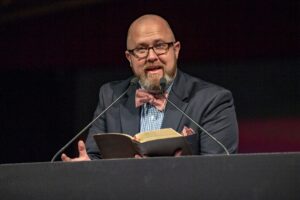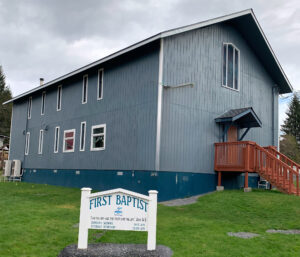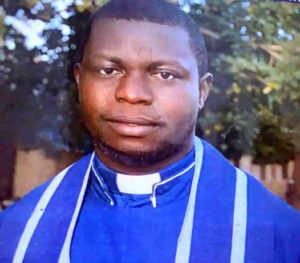
LEWISVILLE, N.C. (BP)–Steve Schenewerk pastors Winston Community Baptist Church, a small congregation about 80 miles south of Eugene, Ore. Like many pastors of small churches, Schenewerk has felt overshadowed in the Southern Baptist Convention by mega-churches and big-name pastors.
Les Puryear, pastor of Lewisville (N.C.) Baptist Church, felt the same way.
After discussions with LifeWay Christian Resources and others within the SBC, Puryear organized “Impact 2008,” a conference just for small-church pastors.
“This was needed,” said Schenewerk, one of 110 participants from 13 states who heard messages about finances, critical issues and possible solutions and how God is at work in the small church.
“The small-church pastor feels isolated and neglected,” said Schenewerk, who received an invitation to attend the conference from Thom S. Rainer, president of LifeWay Christian Resources.
“It’s not intentional, but resources of the denomination go where they will do the most good,” Schenewerk said.
LifeWay was one of the conference’s six sponsors. Four were SBC entities: International Mission Board, North American Mission Board, GuideStone Financial Resources and Southeastern Baptist Theological Seminary. The Baptist Convention of North Carolina was the other sponsor.
Puryear led off the conference with a discussion of small churches in the SBC. Referencing a 2006 LifeWay Research study, Puryear recounted that 62.7 percent of all SBC churches have between one and 99 in attendance on Sundays, while another 20.7 percent have 100-199 Sunday attendees. Those figures debunk the myth that the SBC is a large-church denomination, Puryear said.
“It’s not bad being a small-church pastor,” Puryear told the pastors. “We’re just as important as the largest church in the world. Jesus Christ is the One who builds the church. Jesus must love the small church because He’s built so many of them….
“There is the ‘bigger is better’ mindset,” Puryear added. “Most people don’t see the beauty of the small church. Too many people look at numbers. Christian bookstores are full of books which tell you how to be successful, written by large-church pastors with large-church principles. We may seem like failures to the eyes of the world, but to say we are unsuccessful is wrong.”
Puryear said small-church pastors need to be involved not only with each other but with the SBC at large. Likewise, entities that produce ministry materials need to keep the small church in mind, he said.
“The SBC needs to step to the plate and support small-church pastors,” Puryear said. “They don’t know you and you don’t know them. We have to step to the plate. We have to be involved in state conventions and the SBC. The leadership needs to find out who small-church pastors are and what we need.”
Highlights of the March 27-29 conference included:
— SBC President Frank Page on the role of the small church in the SBC.
— Southeastern Seminary professor of evangelism Alvin Reid on God’s call on the small-church pastor.
— Greg Lawson, Southeastern Seminary professor of Christian education, on financial considerations in the small church.
— Brad Waggoner, vice president of B&H Publishing Group, on critical issues and solutions for the small church.
— Tom Elliff, senior vice president for spiritual nurture and church relations with the International Mission Board, on how small churches can partner locally to reach internationally.
— North American Mission Board evangelism resource manager Dick Church on innovative evangelism strategies for the small church.
— Chris Schofield of the North Carolina convention’s office of prayer for evangelization and spiritual awakening, on effective prayer ministry in the small church.
— Kevin Bussey, a church planter in Charlotte, N.C., on how the small church can be involved in church planting.
— C.B. Scott, senior pastor of Westmont Baptist Church in Birmingham, Ala., on how God is at work in the small church.
— Chris Hauser, associate pastor of South Oak Ridge Baptist Church in Yadkinville, N.C., on how to have a vital children’s and youth ministry in the small church.
— Micah Fries, senior pastor of Frederick Boulevard Baptist Church in St. Joseph, Mo., on affordable technology for the small church.
— David MacEachern, senior pastor of Bat Cave (N.C.) Baptist Church, on how success should be measured in the small church.
Page said he can sympathize with small-church pastors, noting that even though his church -– First Baptist in Taylors, S.C. -– runs more than 4,000 on Sunday, he never considered himself a “SBC insider.” Page told the pastors they need to speak up, stand up and get involved in the SBC.
“You have to let go of the inferiority complex,” Page said. “Some people think you do not have the right to be heard. You need to step up to the plate.”
Reid, preaching from 2 Timothy 2:1-10, encouraged the pastors to support each other. Men were called to be pastors, not pastors of a small church, he noted. He also listed seven principles which relate to leadership reflected in the passage: be grounded in the Word of God, lead by equipping others, lead others in humility, lead others to greatness, lead with faith, lead by defining reality and lead by the strength of one’s character.
“You are the buck that stops here,” Reid said. “Be faithful where you are. It’s a tough job.”
Several speakers underscored prayer as the most important support mechanism for the small-church pastor. Schofield said the first response to any situation in the church should be prayer. He added that for a healthy praying church, it needs a healthy Bible-based prayer ministry and Kingdom-focused prayer patterns that will allow people to experience God’s activity and His “manifested presence.”
“Prayer puts us back in touch with God’s agenda,” Schofield said.
MacEachern closed the conference with a passionate call to his peers to stay strong and believe that God is always working for a believing church.
“If you believe there is a formula to build a church to where your peers say you are successful, move to Texas,” MacEachern said. “God’s way of measuring success and your way of measuring success are worlds apart. God is responsible for measuring success. He will build the church. God has called you and equipped you to scatter the seed. We’re just His instruments.
“If you get your seminary degree and have only 10 people in your church, then make sure they are the 10 best blessed people,” he said.
–30–
Jerry Higgins is a writer based in Raleigh, N.C.














